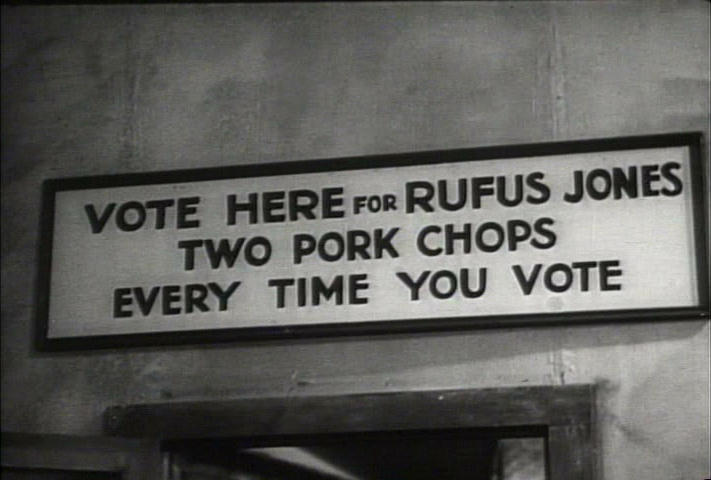
IN DEFENSE OF RUFUS JONES FOR PRESIDENT
A 1933 theatrical film starring Ethel Waters and 7 year old Sammy Davis
Rufus Jones for President Images 2 3 4 5 6 7 8 9 10 11 12 13 14 15 16 17 18 19 20 21 22 23 24 25 26 27 28 29 30 31 32 33 34 35 36 37 38 39 40 41 42 43 44 45 46 47 48 49 50 51 52 53 54 55 56 57 58 59 60 61 62 63 64 65
DOWNLOAD RUFUS JONES FOR PRESIDENT - 212 MB for 21 minute mpg
So
I had to break the window
It was in my way
Better that I break a window
Then forget what I had to say
Or miss what I should see - "Window" by Fiona Apple
I've been enchanted by maybe the most wonderful, delightful short film I ever saw Rufus Jones for President - but I know that I'm not supposed to like it cause its an old film with black people cracking jokes about eating watermelon and stealing chickens. Not that that's the main point of the film, but that's just totally unacceptable now, and it's hard to even try to find out anything about a lot of early black movies like this for all the hand wringing about "racism."
Using Rufus Jones as a microcosm of modern public sentiments on such things, consider some of the public comments about this movie. For example, a Taylor Bowie writes at IMDB "This really is a wretched bundle of nasty racial cliches, but oh my, when Ethel Waters sings I can forgive and forget all the vile and mean-spirited muck around her." Damn, that doesn't sound any kind of nice, does it?
Likewise, one Dick Hunter posting at IMDB wrote "This must have been an embarrassment to every member of the entirely African-American cast. Every derogatory, disparaging stereotype of the black American community is featured prominently. I won't reinforce the insults by listing them here, except to mention chickens, watermelons, and dice."
This kind of thick hatred is a very common response to a wide variety of early black cinema. This short film comes on a DVD with The Green Pastures, a wonderful 1936 all-black movie about the Old Testament story as it might have been understood by a black kid in a Louisiana Sunday school circa 1930. But you apparently aren't supposed to be able to enjoy this tainted but actually somewhat highbrow Broadway play turned high budget, ambitious film because they depict Heaven as a big fish fry and they trowel on the slang dialect a bit, talking about "de Lawd" and such.
Indeed, to be able/allowed to enjoy this really interesting and unique window on 1936, we're apparently supposed to do the penance of sitting through the feature commentary track by some or other obscure modern black filmmakers whining about how bad their itty feelings are hurt by the supposed horrible racism. Something like that. I'm not interested in hearing the details of this.
Shut up already, damn. Some folks have nurtured the chips on their shoulders until they're crushed under the weight of the boulders they've grown. I'm sure this hurts tremendously, but it has little to do with these perfectly wonderful films and everything to do with the arbitrary intellectual and emotional limitations of their own little poisoned private ideological BS (Belief Systems).
The ideological windows of some of these modern PC liberal reality tunnels are covered with such a thick poisonous haze of resentment and victimology that they can't see what they should see in this art. Thus, we get some black folk who are anxious to nurse their grudges of racial victimhood and white folks so anxious to prove that they're not "racists" that they exaggerate and hallucinate to conjure up so much bile that it's a wonder they can breathe.
Best I can tell, we're supposed to think that the Rufus Jones movie was a racist plot forcing poor Ethel Waters et al to help mock and subjugate their own race as part of the ongoing conspiracy by The Man to degrade and hold down the brothers. Every joke about black guys shooting dice furthers the cause of the Klan, as by design. Something like that.
OK then - deep breath. I think my window has a little less crud on it, so let's see if I can make any different sense out of this. Actually, I don't see what's so awful, or so foreign and distant actually, about Rufus Jones for President. In ciphering this out, I'm trying to look at what's there, not what somebody now thinks they should have been putting there. The principle questions would be who exactly made the film for what intended audience, and what were the filmmakers intending to say?
Rufus Jones for President has an all black cast. Best I can tell, it appears to have been intended primarily for a black contemporary 1933 audience. I'm imagining that this is somewhat black folks talking amongst themselves, as per Eddie talking in Ice Cube's Barbershop, saying things you might not would say if there were white folks around. I would not presume that this film accurately reflects contemporary black culture - these portrayals may have been written and directed by white folks. Still, even - nay, especially - greedy white Hollywood Jews made that money by appealing to an audience.
Thus, I suspect that black folks would have mostly thought it funny and warm and charming. That's certainly how it was intended to be understood. Rufus looks to me like pretty much of a FUBU deal. With the wondrous 7 year old singing and dancing sensation Sammy Davis, it's like black folk got their own little Shirley Temple.
Actually though, I don't see how this is really so alien and distant from modern black entertainment that's generally not considered controversial, or is even championed by likely some of the same people bitching about old stuff like Rufus Jones. For a specific point of comparison, I'd liken the tone of the racial jokes in Rufus Jones for President to the Dave Chapelle show. It's harsher than Bill Cosby, much milder than Richard Pryor.

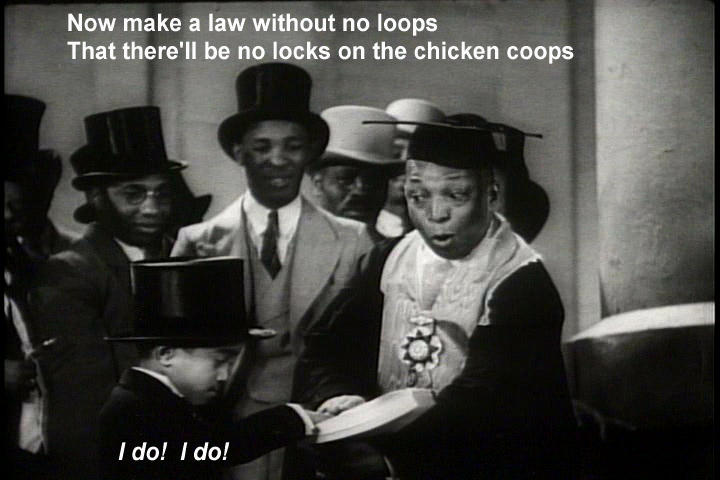
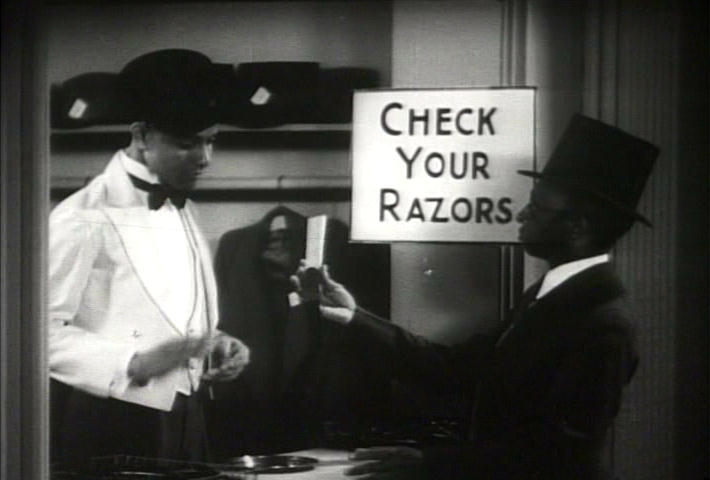
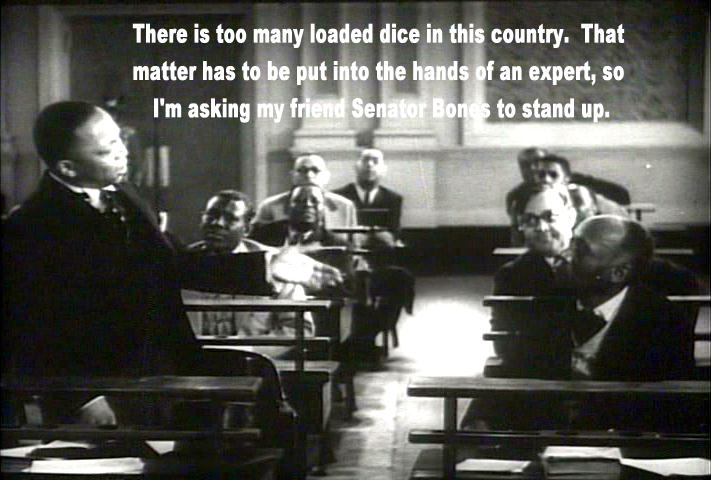
Actually, I thought of the effrontery of Richard Pryor when studying on Ethel Waters souped up version of "Underneath a Harlem Moon," in which she sings "That's why we schvartzes were born." That sounds like throwing the mildly derogatory Yiddish word back. It'd be like a much milder precursor to Richard Pryor 40 years later carrying on about "niggers." The Rufus Jones jokes about watermelon and chicken-stealin' would be fairly tame in the stream of modern black standup comedians.
So what are we sophisticated and enlightened modern folks supposed to make of this 70+ years later? Perhaps they're all suffering from false consciousness, shamefully contributing to their own degradation. I have to think stuff like that sometimes when I see Snoop carrying on about bitches and hos and poppin' caps into niggers asses and such. Some of that still seems to me like valuable art, but surely proudly representing some shameful dysfunctions.
But Rufus Jones for President is none of that. No one in this film is acting in a hostile, depraved or degrading manner. There are jokes about black guys carrying razors, but no one is even threatening to use them. I wouldn't expect this portrayal to make anyone ashamed of being black or make others think less of the black race anymore than I would expect people to look down on rednecks after seeing a Jeff Foxworthy routine. Larry the Cable Guy gives a much more slanderous portrayal of his ethnic group than anybody in this film does for black folk. Particularly, note the irony of these well dressed and fairly dignified high-steppin' senators in their top hats and coats politely checking their razors.
Then again, maybe the creators had double and triple secret depths of meaning and satire. The Dave Chapelle bit I remember most cast Dave as an airline passenger forcing himself to order the fish rather than the chicken that he really wants out of self-consciousness. Thus, it's not really a joke about black folk liking chicken, but about black self-consciousness and shame. Hell, that's starting to sound like art. Maybe some of this Rufus stuff is jokes making fun of the stereotypes themselves.
Also, consider that acknowledging and joking about the stereotypes of your own people can be a way of distancing yourself from them, or rising above them. Irving Berlin, for example, had a bunch of early compositions that might be called "Jewish minstrel" songs such as "Cohen Owes Me 97 Dollars," about an old Jew on his deathbed worrying about the debts that he's never going to be able to collect. That could be Jewish self-hatred - seemingly unlikely from Irving Berlin. It could be just callously catering to prejudiced attitudes - though Jews were apparently the primary audience. Or it could be a backwards way of laughing off such stereotypes as inconsequential, or as something the author has risen above and can thus freely joke about.
But all of this racial nonsense obscures the view. It's like My Cousin Vinny's witness trying to positively identify the murderers based on looking out of his dirty kitchen window through the crud covered screen, and the leafy trees and bushes in the yard. In other words, Rufus Jones for President isn't really about race at all. That's secondary. We've all got so much poisonous racial crud on our windows that we can't see what's actually on the screen.
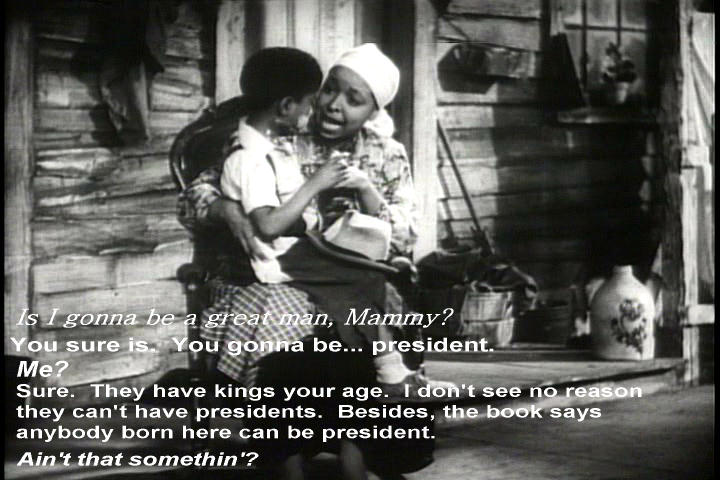
Rufus Jones for President is about a mother's big dreams for her son - and a rather touching and nuanced statement it is at that - at least for a musical short. The whole thing is framed as literally a mother's dream. Her little boy has gotten roughed up on the playground and ran home crying to Mommy, who comforts him with a prediction of great things to come. As they fall asleep in the rocking chair, Mom dreams of her little boy becoming president.
The driving point of this is a demonstration of the mother's pride and joy in her special little man. That's not particularly a racial thing, though that adds some irony in the presumption that the book means what it says about how "anybody born here can be president." Even for 99% of white kids, such hopes are as likely as those "crazy old dreams" of John Mellencamp in "Pink Houses." But that will for a mother to wish great things for her special little guy is common across most racial boundaries. Perhaps this type of emotional theme would appeal less to, say, Palestinian mothers ready to send their babies off to blow themselves up while murdering Jews. Still, this theme would seem to relate across most people of pretty much all ethnic groups most of the time.
But there is one underlying dynamic in this film that does seem to be more particularly about being a black mother. There's a special caution. Even as she's dreaming of President Rufus Jones, she's worrying about her little boy getting hurt. Again, the story is that Rufus has just been treated mean. "Just stay on your side of the fence, and no harm will come to you." she sings tenderly at the end of the film. That conflict between a mother's hopes versus her fear is a fairly poignant underlying dynamic that warms and illuminates all the silly extraneous jokes about watermelon and dice.
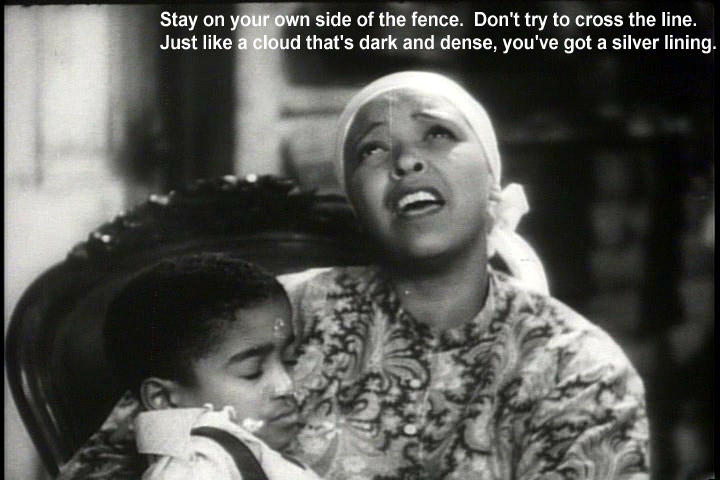
Beyond that, of course, the mother's dream is largely a framework for some musical setpieces, including "Am I Blue?" which had been a hit for Ms Waters, and especially the fascinating souped-up re-write of "Underneath a Harlem Moon." The lyrics of the song as she performs it make rather a good apology for the black man - perhaps a bit of a microcosm of that whole theme of being caught between aspirations and reality. They've put away picking cotton, now they're sporting Parisian hats and steppin' uptown - but still needing house parties to pay the rent and a sense of humor about it as a critical coping mechanism as they struggle to improve their lot. .
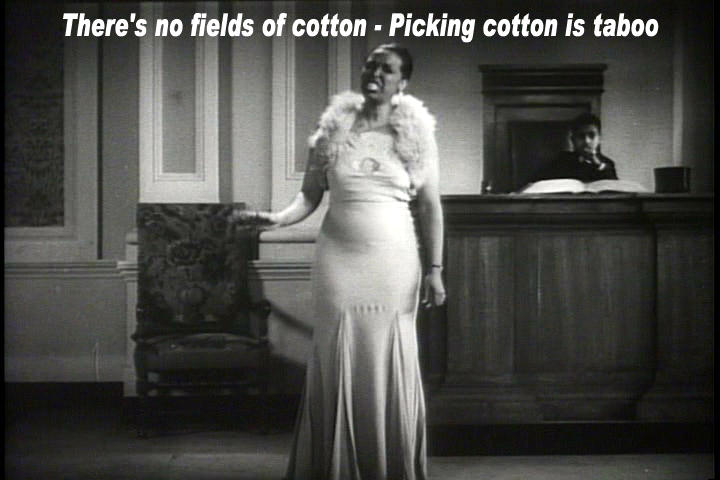
Then there's the real star of the show: Rufus Jones himself, Sammy Davis. This little dude was sharp. He could do a great soft shoe, sing and just beam. This was contemporary to Shirley Temple, and she didn't have squat on little Sammy for cute or talent. Shirley Temple was setting the gold standard for child actors- so I don't mean to deny her due credit, but this prime blast of Sammy does more for me than any Shirley Temple movie ever did.
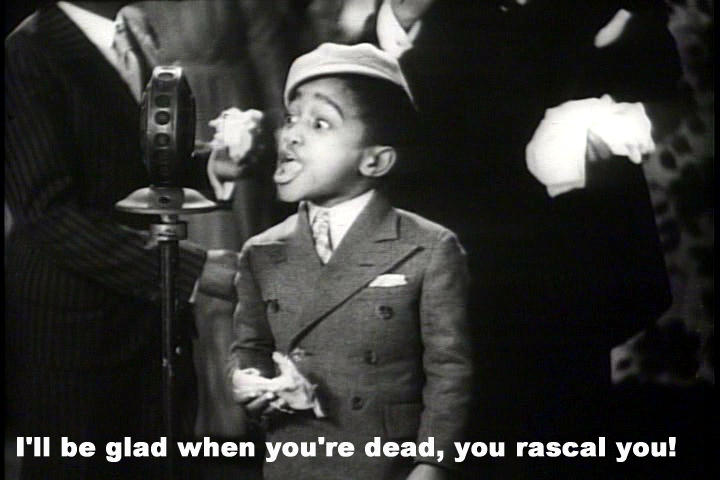
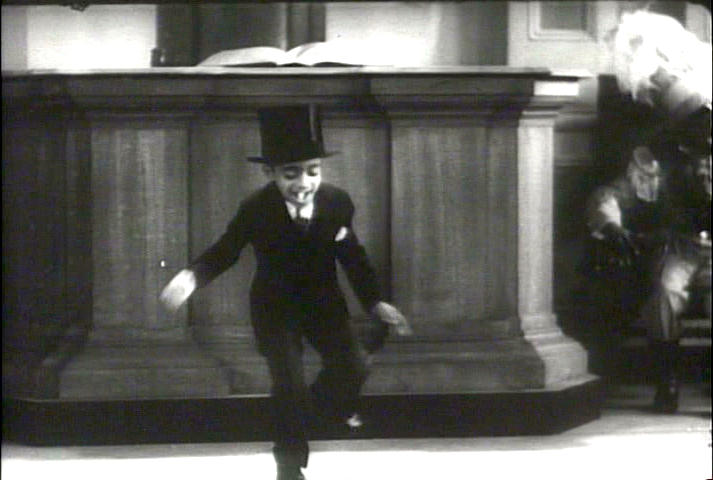
I'm just saying this film would be a piss poor recruiting film for the Klan, cause I don't see anything but love. You'd have to be pretty severely hard hearted to see President Sammy in his top hat dancing his little heart out and not just want to hug him and kiss him and feed him and every little kid that looks like him milk and cookies. Could you possibly get anything more lovable than young Sammy belting out "I'll Be Glad When You're Dead, You Rascal, You"?
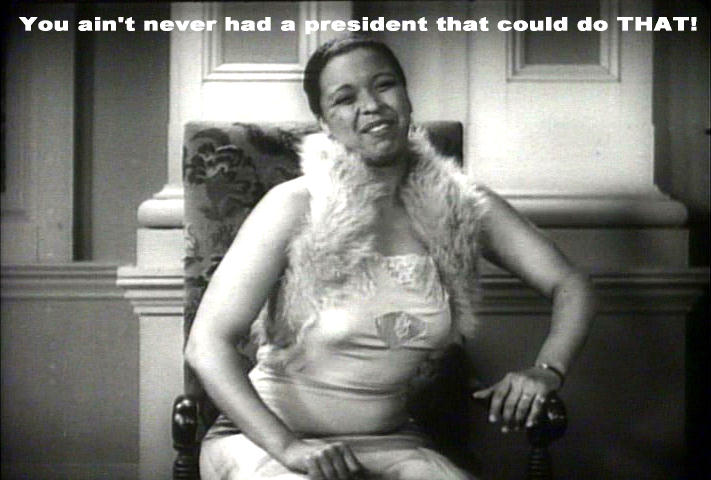
Best I can tell, it's strictly a BYOH affair if you're hatin' after seeing the mother beaming with pride over her fine little man like this. She's certainly right to say, "You ain't never had a president that could do THAT!" Damn straight. The mother love of Ethel Waters warms every frame of this film.
On the other hand, some folks just get off on being offended, or worse, choosing to feel hurt by any possible thing. It's like they get off more on having hurt feelings than on digging some rare special grooviness from some of our finest luminaries of that increasingly distant era.
They're missing out.
"Unto the pure all things are pure: but unto them that are defiled and unbelieving is nothing pure; but even their mind and conscience is defiled." Titus 1:5
MoreThings Log [updated frequently]
Link Soup
morethings master
photo gallery index
little richard photos
buddy holly pictures
fats domino images
chuck berry pictures
01/
02/
03/
04/
05/
06/
07/
08/
09/
10/
11/
12/
01/
02/
03/
04/
05/
06/
07/
08/
09/
10/
11/
12/
01/02/
03/
04/
05/
06/
07/
08/
09/
10/
11/
12
01/
02/
03/
04/
05/
06/
07/
08/
09/
10/
11/
12/01/
02/
03/
04/
05/
06/
07/
08/
09/
10/
11/
12/08/
09/
10/
11/
12/
manchurian candidate pictures
lucille ball images james
blunt photos
clint eastwood pictures lena
horne images team
america pictures
robert mitchum photos
bruce springsteen pictures
mariah carey pictures
ann coulter photos
sissy spacek pictures
tanya tucker images
loretta lynn pictures
beatles pictures
white stripes pictures
andy griffith pictures
kill bill pictures
parliament funkadelic p-funk pictures
beverly hillbillies pictures
al
barger
frank zappa pictures
jerry lee lewis pictures
richard pryor photos
june carter johnny cash pictures
vic mackey shield pictures
macy gray pictures
james cagney images
elvis presley pictures
gwen stefani images
dolly parton pictures
devil whores pictures
tom petty photos
tori amos pictures
joaquin phoenix images
Quills movie images
peter lorre images
reese witherspoon pictures
flaming lips images rolling
stones photos
fiona apple images dr
strangelove pictures elvis
costello images
ray charles photos marx
brothers pictures
prince rogers nelson pictures blazing
saddles images
sinead o'connor images
eddie murphy photos all
in the family pictures
south park pictures homer
simpson images
bob dylan pictures elizabeth
taylor photos drawn
together images
saturday night live pictures hee
haw pictures james
brown images pete
townshend photos
tina turner pictures
dixie chicks photos
robert anton wilson images
guns n roses
jodie foster photos
borat
eminem
frank sinatra photos